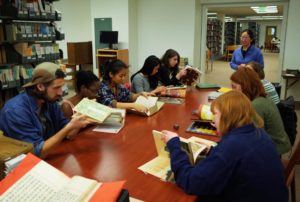
Teaching in the Asian Library
We welcome opportunities to work with faculty to teach primary source literacy and incorporate Special Collections materials into course curriculum. Our librarians are available to teach or co-teach a remote or in-person class and support you in a number of other ways.

Teaching in the Asian Library
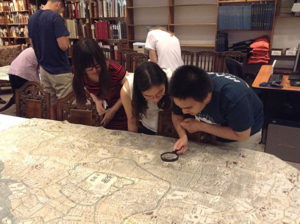
Japanese maps class in Special Collections
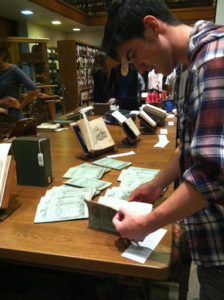
Class visit to Special Collections
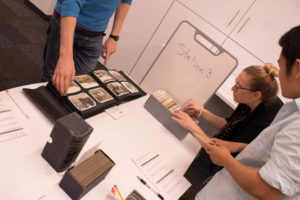
Special Collections instruction
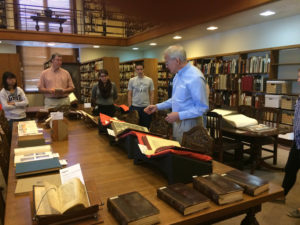
Class visit to Special Collections
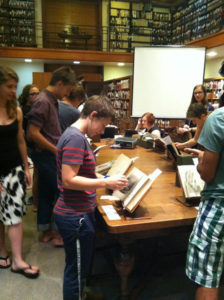
Class visit to Special Collections
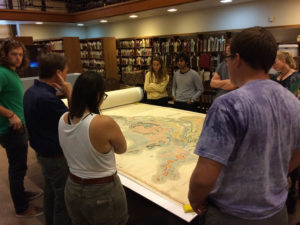
Geology class in Special Collections Reading Room with Smith map
The Claremont Colleges Library Special Collections Librarians demonstrates our commitment to empowering confident, critical, and creative information users and producers through the instruction and promotion of primary source literacy. In support of that mission, we follow the Association of College and Research Libraries’ Guidelines for Primary Source Literacy. Our instruction is learner-centered and encourages hands-on engagement with rare materials and archives regardless of the user’s level of experience.
Our Special Collections librarians work closely with faculty as teaching peers to offer primary source literacy instruction with Special Collections materials. This instruction may also occur in coordination with a teaching/subject librarian or in partnership with other repositories at The Claremont Colleges. Our librarians are trained in learner-centered instruction with primary sources. In addition to disciplinary training, our Special Collections librarians bring knowledge of rare books, archival organization and management, preservation, copyright and fair use, digital scholarship, collection development, and other competencies to the classroom.
We offer a variety of primary source literacy learning opportunities and also welcome new ideas. A few examples of past learning objectives taught in the classroom include:
Identify and communicate information found in primary sources, including summarizing the content of the source and identifying and reporting key components such as how it was created, by whom, when, and what it is.
Find a primary source using appropriate, efficient, and effective search strategies in order to locate a primary source for a topic of inquiry.
Understand that historical records may never have existed, may not have survived, or may not be collected and/or publicly accessible, also understanding that existing records are shaped by the selectivity, mediation, and biases of individuals, potentially limiting the sources available for research.
Examine and communicate the visual and aesthetic features found in modern graphic art materials associated with a social movement in order to provide historical context of artistic traditions within modern and contemporary art movements.
In addition to synchronous primary source literacy instruction, we offer a variety of services that help faculty and instructors incorporate primary source literacy and Special Collections materials into their courses. We can:
To request an instruction session please fill out the Special Collections Instruction Request form . Once we receive your request, one of our librarians will be in touch to schedule a one-on-one consultation to go over your course goals and objectives. For questions about your request or instruction in general, contact the Special Collections Public Services Librarian.
Our Special Collections librarians are your educational partners and are ready to customize each instruction session to your specific course needs and goals.
In order to create effective learning experiences and to help us adequately prepare for an instruction session, please submit your instruction request no later than 2 weeks before the date you’d like the session to occur.
We ask that you schedule a teaching/pedagogy consultation with a Special Collections librarian before each instruction session. During the consultation, you will be asked what you would like students to gain from the experience, what learning objectives you have in mind, and if there are specific materials or types of materials that will support your students’ learning. We are happy to work with you to formulate relevant learning objectives, in-class activities and take-home assignments, as well as help you curate a list of materials for your students’ visit.
We strongly recommend your presence during instruction sessions. In our experience, students are more engaged and find more value in a Special Collections instruction session when you are present and participate.
Please alert us if you have students that require accommodations. We will do everything possible to provide your students with accommodations during a Special Collections instruction session. To see how the library supports accessibility, please visit our Accessibility page.
A note about Special Collections materials:
When incorporating physical materials into instruction sessions or other activities/assignments, please allow sufficient time for the selection, paging, reviewing, and, if applicable, digitization of the materials. We encourage instructor participation in materials selection.
Our Special Collections librarians curate materials to support the session’s learning objectives. Course instructors are welcome to send student research interests, however they may not be used as the basis for selection. Librarians strive to teach the requisite skills to support student learning, research, and exploration of the collections.
Please understand that we may not be able to accommodate all materials requests due to fragility, availability, and time/space constraints.
Every class session using materials from the collections will cover proper care and handling of Special Collections materials. All members of the class and other visitors are expected to adhere to the Reading Room Policy.
Special Collections librarians and staff have created a variety of resources available to faculty and students interested in working with primary sources.
Explore themed guides and checklists that we have created for classes, exhibitions, and events. These thematic bibliographies provide glimpses into the breadth and depth of rare and unique collections that are available for your instruction session in Special Collections.
Developed collaboratively by librarians in Special Collections and in the Research, Teaching, & Learning Services division, the process research sequence moves students through multiple steps in a research process.
Materials for the sequence are selected to fit the focus of the course. Originally developed as a two-part series for graduate students, librarians have adapted the sequence to work with classes at all levels. Please let us know if you are interested in adapting this sequence for your class(es).
The Claremont Colleges Library Oral History Toolkit provides a brief introduction to the process of creating oral histories. It includes information on oral history methodology, the different interview stages, forms such as the Participant Consent and Release Form and the TCCL Special Collections Deed of Gift Form, along with other helpful resources.
Please contact the Western Americana Manuscripts Librarian with questions about conducting or archiving oral histories.
Our teaching librarians are eager to work with you to incorporate primary sources into your classroom.